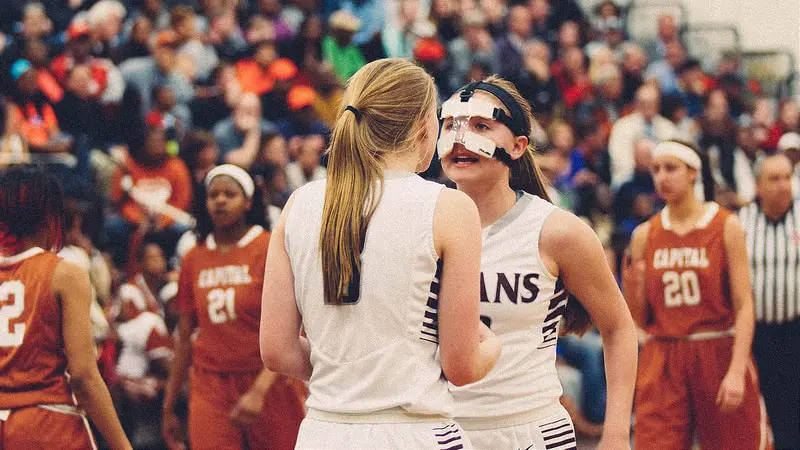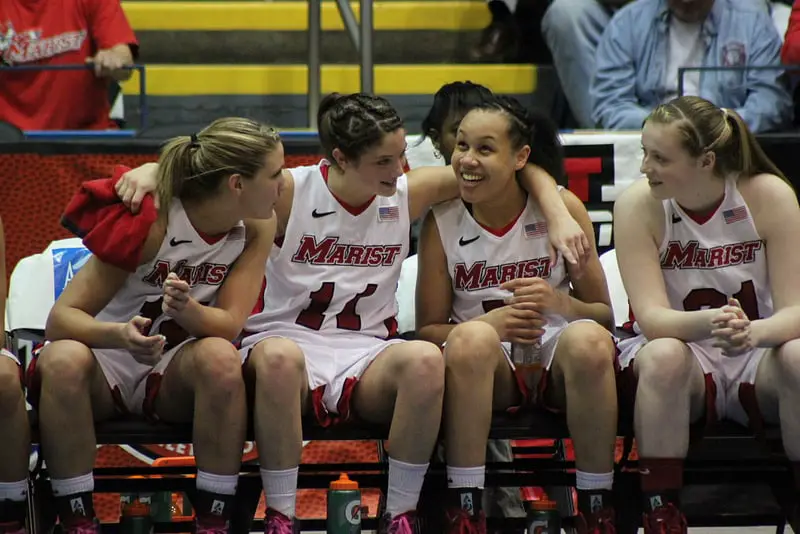Table of Contents
*This post may contain affiliate links. As an Amazon Associate we earn from qualifying purchases.
Everyone knows that a winning team works together as one. And this takes trust. Wondering how to build trust in your teammates? Well, it starts by understanding what trust is. Think of it this way: trust is having a feeling of confidence in someone. When you feel that you can rely on someone to behave reliably, then you trust that person. But this feeling doesn’t develop overnight.
Whether you’re an individual athlete or part of a team, you’ll need to rely on others. These others may include coaches, managers, psychologists, physiotherapists, nutritionists, and more. For you to become successful, you need to be comfortable with the idea of relying on those who work to make you the best athlete that you can be. That is what learning how to build trust is all about.
The Role Trust Plays in a Sports Team

Learning how to build trust in your teammates takes time and energy. It’s not always easy, and it’s not always smooth. Understanding the role of trust can help you to stick with the process, even when it’s difficult.
Trust helps teammates work together effectively
Some games are by their very nature, team games. No matter how talented one player is, that person cannot play in all positions nor do everything. These games include sprint relays, some kinds of gymnastic sports, badminton, tennis, beach volleyball, soccer, and rugby. For a game to take place, everyone must trust each other.
For example, in marathons, long-distance runners usually strategize as they run with their compatriots. At the end of the run, the pacemaker may end up falling behind, having ensured that a teammate is on the way to a win. Marathoners also rely on the team in the background who helps in training, counseling, supporting, managing and teaching them, to do well. An excellent example of an athlete who credits his trusted team for his success is the current world’s best marathoner, Eliud Kipchoge.
It builds team morale
When players trust each other, then they enjoy playing with each other. By trusting people to do their part, you help them feel that they are part of your team’s success. That, in turn, helps to boost team morale. When team players are energized, then their performance improves.
It reduces anxiety and stress for team players
A sports team where people don’t trust each other creates a toxic environment in which to train. This kind of environment increases team members’ anxiety and stress levels. And once that takes place, you can forget about performance improvement. The more anxious and stressed out players are, the more likely they are to suffer from other psychological issues. But that’s not all. Such players may end up abusing substances like alcohol to try and cope with what they are dealing with.
However, if you taught everyone how to build trust, then their stress levels would reduce. Players will know that they can rely on each other in tough times. Your teammates will be in a better position to work together on and off the field.
It helps team members to deal with failures together
No one wants to perform poorly after investing so much time and energy into their athletic training. Unfortunately, it happens even to the best players. If you don’t trust your team and always try to do everything, you will suffer for it. Your teammates may turn on you and blame you for failing since you wanted to take credit for everything. Trust in a sports team is important because it enables people to work together toward a common goal. When everyone has done so and still failed, it would not be a matter of whose fault it was. Instead, everyone will deal with the failure as a team.
It helps team leaders direct the team
If you’re a team leader and your teammates don’t trust you, then there’s no way they will take instructions from you. You, too, must believe your team members will do right by each other. The legendary soccer manager Sir Alex Ferguson was able to steer Manchester United to multiple victories over the years because he learned how to build trust in his team. Everyone he worked with learned to trust his decisions.
It enhances team performance
Soccer is the world’s most popular sports game. And it requires teamwork. How well the team plays will depend on whether they have each other’s back or not. In 2014, Germany beat Argentina and ended up winning the World Cup. One of the things that stood out was how great of a team Germany was. The entire team worked like a well-oiled machine to win the World Cup. You must know how to build trust so that you can become a part of a well-oiled machine as well.
How to Build Trust in a Sports Team

Now that you’re aware of the importance of building trust and implementing that knowledge, it’s time for the next step. You need to learn how to build trust. The strategies that you use will determine whether your teammates end up trusting each other or not.
Communicate your team goal for a culture of trust
If you notice an issue with trust among your teammates, then you need to tackle it head-on. Create the awareness that the problem exists. It helps if you’re the captain or manager of the team. But if you’re not, don’t be afraid to speak up. Let your teammates know that things need to change, and give them time to think about the issue.
Set reasonable structural policies
Aimlessness has no place in a team that needs to build trust. With this in mind, you need to create a structure that guides team players and the support system. You can help to create a team charter that will outline your team’s goals and the functions of each team player. Let these policies guide how you and your teammates conduct yourselves.
If everyone has an idea of what their roles and responsibilities are, they’ll be more likely to do what is expected of them. Besides, when they begin to prove their abilities, they will show that they’re reliable. In turn, teammates will start to trust each other because they will be comfortable with depending on those who have proven their trustworthiness.
Stop the blame games
Do you always blame other people for everything, including your own failures? No one can trust you if you’re always trying to blame them for mistakes. Neither can all the other teammates trust each other if everyone keeps throwing other team members under the bus. People need to learn from their mistakes in order to perform better. But no one can do that if they’re afraid of being punished for those mistakes. Forget about assigning blame, and work together for everyone’s improvement.
Treat everyone with respect
Respect the people that you work with. It doesn’t matter what their position is. No matter how small a role they play in your team’s success, it’s still important. Also, respect yourself and your job as an athlete. When people respect you and the kind of person you are, they are more likely to trust your decision making. You will find this to be true for yourself also. Your ability to believe in other people will depend on how much respect you have for them.
Take time to create bonding sessions
Outside your training, what do you know about your teammates? There’s no way you can learn how to build trust without considering the personal sides of the people you work with. Take the time to understand who your teammates are outside of training. Learn what drives them and the challenges that they have.
When you hang out during bonding sessions, then you’ll develop close friendships with your teammates. We have famous athletes like LeBron James and Dwyane Wade who are friends in reality. They once played for Miami Heat and are among the best in their field.
No playing favorites
Favoritism and discrimination lead to resentment, which creates toxicity within the team. Then no one will trust the other. You could, of course, work hard to stand out if you are one of the athletes experiencing discrimination. But there’s no guarantee the situation will change. You may have to take the bull by the horns and call out the people doing the discriminating.
If you’re a captain or manager, then remember that you should treat all of your teammates equally. Appreciate them when they perform well. Anyone who gets out of line should also be punished equally across the board depending on the penalty laid down for that misbehavior. Don’t give some people special treatment because your team will distrust you. Discrimination within a sports team often leads to cliques. The resentment that people in different groups feel will often spill over to the field, which will affect performance.
Ensure that you keep the secrets of those who confide in you
If you have taken the time to know more about your teammates, then at some point they may confide in you about their problems. That is especially likely if you are a team captain or coach. Unless their secrets pose a danger to them or someone else, you will do well to keep quiet about what you have learned. Don’t use the information you have against your teammates. Encourage other team players to behave the same way.
Encourage mutual feedback sessions
To address the team problems that crop up, people have to be able to discuss them openly. That can only work if you help to create a forum where people can air out their views and feelings without the fear of repercussions. That kind of mutual feedback session helps to build trust as people work through their issues as a team. Not all the problems that you discuss will be personal. Some will, of course, relate to sports strategies and how to implement or improve them.
Incorporate team building activities
Gymnasts tend to achieve artistic feats that most people cannot do. But for rhythmic or aerobic gymnastics athletes in team games, the risks are much higher. Without trust, some of the things they do would never happen. These athletes must rely on each other to play their individualized roles as part of the gymnastics team. They may have to jump believing that their teammates will complement their moves. This kind of trust can only come through constant practice with each other.
Learning how to build trust in your teammates is hard work. In addition to regular practice, you also need to engage in other team building activities.
Don’t make unfounded accusations
When someone accuses another person in the team of wrongdoing, find evidence before you pick a side. Where possible, try to get people to solve their problems. As a sports team leader, you should only intervene when there is no solution in sight. Siding with an accuser without proof can be detrimental to the cohesiveness of your team. You will increase the level of suspicion, and the trust you have worked hard to build will disappear.
Speak up for your team
Speak up for your teammates even if some people have made a mistake. You can always sort out issues behind closed doors. Also, speak up for any teammate who may be undergoing abuse at the hands of other team players, regardless of those players’ seniority, especially where children are involved. When everyone has each other’s back, they end up trusting each other more. Consequently, the team will become more cohesive and united.
Concentrate on each other’s strengths
Every human being has weaknesses. People can improve those weaknesses only to a limited extent. Strengths, however, can be refined. If you want teammates to learn how to build trust in each other and be successful at it, give them something to do that highlights what they’re good at. That keeps them from stepping on each other’s toes. There will be a higher level of commitment and autonomy since each person can be relied upon to do their part. Moreover, trust within the team will improve.
Work with an external life coach
If you’re struggling with how to build trust because there are just too many issues to sort out, hire an external life coach. Sometimes you need an outside professional perspective to help the team move forward and get rid of their trust issues. It will help everyone work out their mental blocks so that they can learn to depend on each other better.
Build Trust in Your Sports Team for Additional Success

Learning how to build trust among your teammates will take time. Since it’s a very crucial aspect of a sports team’s success, you must build trust no matter how long it takes. So, use the strategies that suit your team’s needs the best and watch your team’s performance improve to significant heights. It requires patience, but the results will be worth it.

